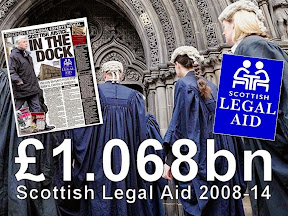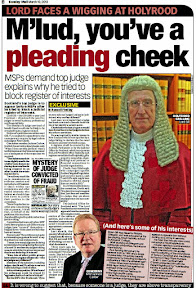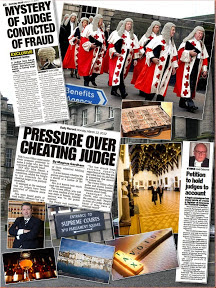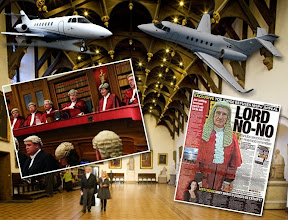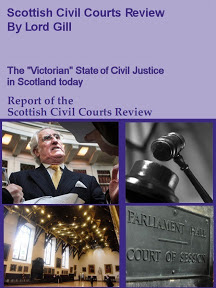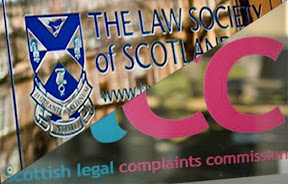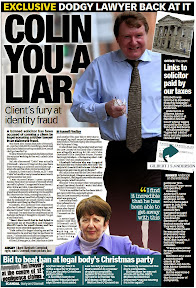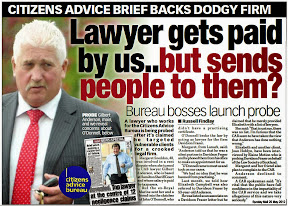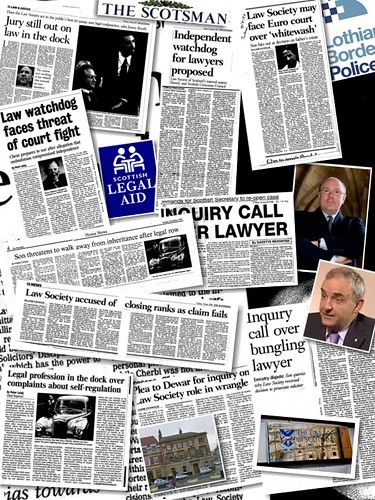Consumers are not protected by lawyers regulating lawyers. SCOTLAND’S legal profession and anyone connected to it – including the judiciary – often praise the system of self regulation where lawyers look after their own – to the point of taking over and closing any public debate on creating independent regulation of solicitors.
And, of course lawyers will continue to regulate themselves in Scotland – because self regulation is too protected by vested legal interests, because it allows a solicitor to rip off their client, to be judged by his colleagues and to walk away from it, no matter what was done to the client.
Time and again, lawyers look after their own, investigate themselves, appear in front of their friends at the Scottish Legal Complaints Commission (SLCC), and, at most, receive a censure, or slap on the wrist from the Scottish Solicitors Discipline Tribunal (SSDT).
Diary of Injustice recently reported on how the SLCC refuses to identify corrupt lawyers within determination decisions which are only published after being approved by the Law Society of Scotland, featured here: FROM ROGUES TO RICHES: SLCC refuse to identify corrupt solicitors in case findings.
The SLCC print lists of doctored histories of complaints against lawyers, and then refuse to identify the solicitors who ripped off their clients – how corrupt is that!
Compare this to England & Wales, where decisions made by the Solicitors Regulation Authority in relation to identified law firms and names of solicitors can easily be found here Recent Decisions – Solicitors Regulation Authority.
Striking’s off rarely occur, only as a last resort for the members of Scotland’s legal profession must protect their own.
The slick SSDT website invites you, the public – to have confidence in the ways lawyers look after their own.
Yet in decision after decision, the extent of dishonesty during proceedings renders much of what is published in Tribunal ‘interlocutors’ as clever forgeries of the acts of wilful, determined and well practiced thieves – far more determined than will ever be told in public.
The noticeable lack of action by the SSDT to report solicitors to the Police & Crown Office for prosecution, does, as the years go by, verify the position that the SSDT seeks to protect solicitors from the full weight of criminal law – which applies to everyone else.
However, on that rare occasion where solicitors do appear in court, you just know they are not going to jail.
In a prime example of the above, earlier this week Scotland was meant to weep like a child after the Law Society sought to publicise the fact Paul O’Donnell – a solicitor from the law firm of Thorley Stephenson, in South Bridge – had sold his house to repay more than £21,000 he pled guilty to embezzling from the Edinburgh law firm Thorley Stephenson, in South Bridge .
O’Donnell, 35, had previously been warned he was facing jail for the embezzlement but the judge – Sheriff Frank Crowe – allowed him to remain free as he had repaid the £21,485 he had obtained dishonestly.
In court – O’Donnell’s defence lawyer – Murray Robertson told Sheriff Crowe that his client had sold his house, moved in with relatives, and the money had been repaid to Thorley Stephenson.
Sheriff Crowe was also told O’Donnell had been sequestrated, was declared bankrupt and is no longer practising as a solicitor.
In response, Sheriff Crowe told O’Donnell that cases of this nature usually involved a sentence of imprisonment but, as O’Donnell had co-operated and admitted his guilt, arranged the sale of his house and returned the money to Thorley Stephenson, Sheriff Crowe avoided sending O’Donnell to jail and instead confined him to his current address from 9pm to 6am for six months.
You may be forgiven for thinking how amazing a lawyer who stole, avoided jail.
However, in the rare occurrences when solicitors do come before our courts, jail is always a last resort for the judge – who are themselves, lawyers.
So, with facts in hand that our courts take a shine to lawyers with tears in their eyes, it should be of little surprise the latest rulings by the Scottish Solicitors Discipline Tribunal offer mere censures and fines for executry and will fraud, theft and embezzlement – which are crimes to ordinary people in the real world.
Law Society-v-Euan Maxwell Terras
This case involved a solicitor in his writing and executing a Will in which his family were the Primary Beneficiaries. An amazing story, yet only punishment is a fine.
Read the ‘published’ details of the hearing here Council of the Law Society of Scotland v Euan Maxwell Terras
Edinburgh 29 August 2016. The Tribunal having considered the Complaint at the instance of the Council of the Law Society of Scotland against Euan Maxwell Terras, Sprang Terras, 64 Kyle Street, Ayr; Find the Respondent guilty of professional misconduct in respect of his acting in the purchase of a property with the ancillary execution of a Minute of Agreement and the drafting of a Will where his son was the residuary beneficiary and found that in doing so (1) he acted in an actual conflict of interest situation in the purchase of the property and the execution of the Minute of Agreement where he had a personal and/or financial interest in both; (2) he did not insist that Miss MM consult other solicitors either in the purchase of the property or the execution of the Minute of Agreement when both were actual conflicts of interests; (3) he could not discharge his professional obligations to solely look after the interests of Miss MM both in the purchase of the property and the execution of the Minute of Agreement given the actual conflict of interest in both between him and Miss MM; (4) he called into question his personal integrity/independence in taking instructions and/or drafting the second Will which benefitted members of his family and in terms of which they would derive significant benefit; and (5) his advice, given the terms of the draft second Will, was not free from external influence and placed him in a conflict of interest; Censure the Respondent; Fine the Respondent the sum of £8,000 to be forfeit to Her Majesty; Find the Respondent liable in the expenses of the Complainers and of the Tribunal.
Law Society-v-Philip Simon Hogg
Philip Hogg was one of a two-partner Kirkintilloch firm – Alder Hogg. His co-partner was his twin sister Alison Hazel Margaret Greer. The case relates to massive overcharging of clients. – usually defined as fraud if not involving a solicitor.
The following is for one client: The Interlocutor final amount is that for £129K of legal work they charged £219K for £90K more than they should have. So, for this one client, in relation to Mr A’s executry, it is accepted that £90K was overcharged, however the Tribunal does not explain why a staggering £129K of executry fees was deemed acceptable.
Read the full ‘published’ version of events in this shocking case here: Council of the Law Society of Scotland v Philip Simon Hogg
Edinburgh 25 August 2016. The Tribunal having considered the Complaint dated 22 April 2016 as substituted by the Complaint dated 25 August 2016 at the instance of the Council of the Law Society of Scotland against Philip Simon Hogg, residing at 9 Crossdykes, Kirkintilloch, as amended; Find the Respondent guilty of professional misconduct in respect of his failure in his obligation to see that the firm in which he was a partner complied with the accounts rules, his failure in his duty to supervise the firm’s office manager and cashier, his failure in his duty to take steps to satisfy himself that fees being charged to executries were properly so charged, his failure to see that at all times the sums at credit of the client account exceeded the sums due to the clients and his continuing to draw from the firm while it was being financed by the overcharges to clients; Suspend the Respondent from practice for a period of five years and Direct in terms of Section 53(6) of the Solicitors (Scotland) Act 1980 that the suspension shall take effect on the date on which these findings are intimated to the Respondent;
Law Society-v-Jane Elizabeth Steer
Elizabeth Steer worked for a Falkirk firm RMS Law. She previously worked for Russell & Aitken and now works for Allan McDougall & Co.
Ms Steer was accused of falsifying an Affidavit.
Affidavits MUST adhere to the following: 1. both parties must be physically present at the signing i.e. the solicitor (notary public) and their client 2.it must be signed at the locus specified in the Affidavit
The affidavit complied with neither of these tests, instead Ms Steer sent it to her client in England to sign and return.
Problems with the affidavit only came to light when the client gave evidence stating that she had not been in Scotland for a while – but when at Avizandum the Sheriff realised that the Affidavit was signed in Scotland at a time when the client swore she was in England.
To make matter worse, Miss Steer also tried to mislead the Law Society during the Investigation. Read the full published Interlocutor here: Council of the Law Society of Scotland v Jane Elizabeth Steer
Edinburgh 16 August 2016. The Tribunal having considered the Complaint dated 31 May 2016 at the instance of the Council of the Law Society of Scotland against Jane Elizabeth Steer, Messrs Allan McDougall, 3 Coates Crescent, Edinburgh as amended; Find the Respondent guilty of professional misconduct in respect of her failure to act with trust and personal integrity in connection with the preparation of an affidavit which she purported to notarise on 29 October 2012, submission to the court for lodging an affidavit which contained false or misleading information on 5 November 2012 and subsequent failure on 29 June 2014 to provide a full and candid explanation to the Law Society in connection with the preparation of the affidavit and its sending to the Secondary Complainer; Censure the Respondent;
And remember, readers – wherever there is dishonesty, there is a Scottish solicitor, and the Scottish Solicitors Discipline Tribunal.
THE DISHONESTY FACTOR:
An investigation by BBC Panorama – Lawyers Behaving Badly – featured the case of John O’Donnell, and went on to reveal the startling differences in how dishonesty in the Scottish legal profession is treated lightly compared to England & Wales – where dishonesty is automatically a striking off offence.
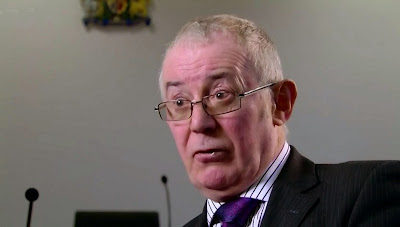 Alistair Cockburn, Chair, Scottish Solicitors Discipline Tribunal. Featured in the investigation was the Scottish Solicitors Discipline Tribunal (SSDT) Chairman’s attitude towards solicitors accused of dishonesty in their representation of clients legal affairs. During the programme, it became clear that dishonesty among lawyers in Scotland is treated less severely, compared to how English regulators treat dishonesty.
Alistair Cockburn, Chair, Scottish Solicitors Discipline Tribunal. Featured in the investigation was the Scottish Solicitors Discipline Tribunal (SSDT) Chairman’s attitude towards solicitors accused of dishonesty in their representation of clients legal affairs. During the programme, it became clear that dishonesty among lawyers in Scotland is treated less severely, compared to how English regulators treat dishonesty.
Sam Poling asks: The Scottish Solicitors’ Discipline Tribunal hears all serious conduct cases against solicitors. Last year they struck off nine of them. But is this robust enough?
Alistair Cockburn Chairman, Scottish solicitors discipline tribunal replies: It is robust in the sense that it doesn’t just give convictions on the basis that somebody’s brought before us charged by the Law Society. We are mindful, particularly when reminded of the lay members, of a duty to the public.
One is always concerned when there is deception but you can have a situation where solicitors simply lose their place. They make false representations in order to improve their client’s position, not necessarily their own. And you would take that into account in deciding what the penalty was but there’s no suggestion that such conduct wasn’t deemed to be professional as conduct.
Sam Poling: So there are levels of dishonesty which sit comfortably with you, satisfactorily with you?
Alistair Cockburn: No it’s not a question of saying sitting comfortably with me. I’ve told you…
Sam Poling: OK that you would accept?
Alistair Cockburn: No I’d be concerned on any occasion that a solicitor was guilty of any form of dishonesty. One has to assess the extent to which anyone suffered in consequence of that dishonesty. You have to take into consideration the likelihood of re-offending and then take a decision. But you make it sound as if it’s commonplace. It isn’t. Normally dishonesty will result in striking-off.
 English QC’s agree ‘dishonesty’ is a striking off offence. The SSDT Chairman’s comments on dishonesty compared starkly with the comments of the English QC’s – who said dishonesty was undoubtedly a striking off offence.
English QC’s agree ‘dishonesty’ is a striking off offence. The SSDT Chairman’s comments on dishonesty compared starkly with the comments of the English QC’s – who said dishonesty was undoubtedly a striking off offence.
Andrew Hopper QC: “I cant get my head round borrowing in this context. Somebody explain to me how you can borrow something without anyone knowing about it. That’s just taking.”
Andrew Boon Professor of Law, City University, London: “They actually say in the judgement they would have struck him off but the client hadn’t complained.”
Andrew Hopper QC “We’re dealing with a case of dishonesty and that affects the reputation of the profession. I would have expected this to result in striking off.”
Andrew Boon, Professor of Law: “The critical thing is the risk factor. If somebody has been dishonest once the likelihood is that they are going to be dishonest again unless they’re stopped.”
As Sam Poling went on to report: “but he [O’Donnell] wasn’t stopped. The tribunal simply restricted his license so that he had to work under the supervision of another solicitor.”
Previous reports on the Scottish Solicitors Discipline Tribunal can be found here: Scottish Solicitors Discipline Tribunal – Pro-lawyer protection against client complaints



















